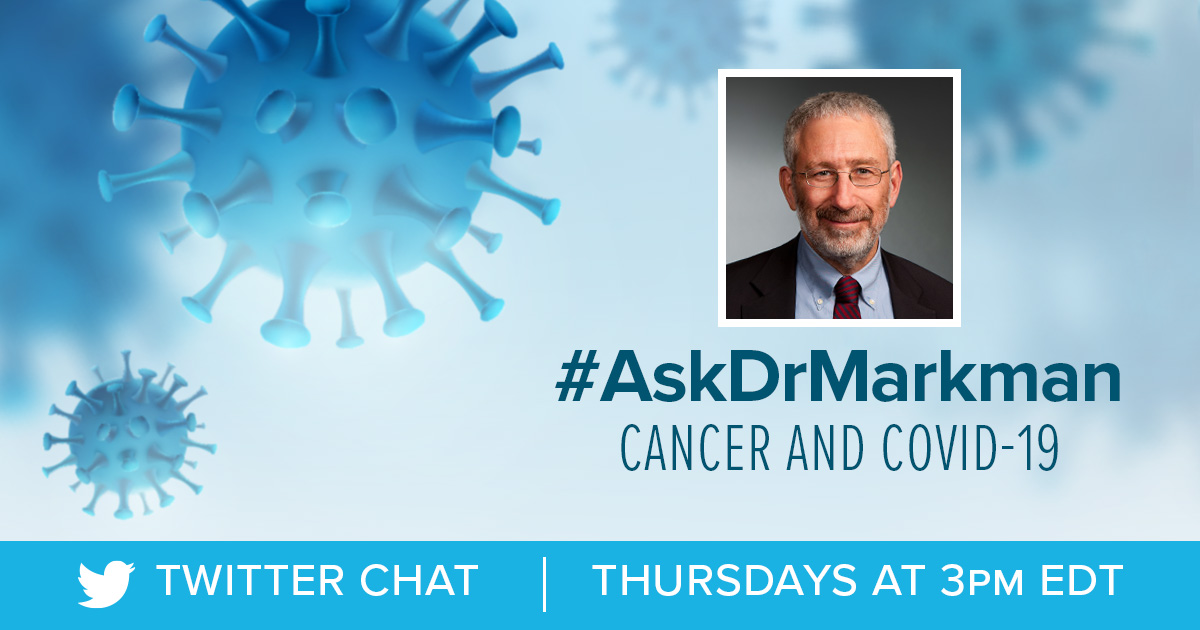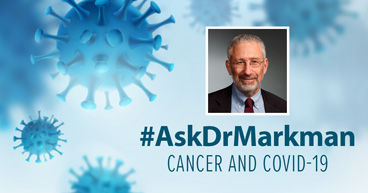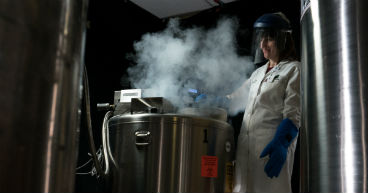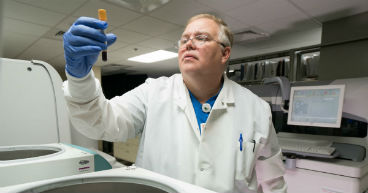
The COVID-19 pandemic has created a constantly evolving flow of new and sometimes confusing information. Cancer patients have many questions about how the virus may affect them, their access to ongoing treatments, their overall health and steps they can take to help reduce risk of infection. Maurie Markman, MD, President of Medicine & Science at Cancer Treatment Centers of America® (CTCA), has launched a weekly Q&A hosted on Twitter to answer your questions, in real time and as questions are sent to us online and by phone. Follow us on #AskDrMarkman. Here’s this week’s chat:
Question: I am being treated for lymphoma, and I realize I have a greater risk if I am infected with COVID-19. I’m concerned because I don’t know if I have any other medical conditions that may further increase my risk for a serious infection.
Answer: In addition to cancer, several associated medically related risk factors have been identified based on the reported experiences in the United States and other regions of the world. In one report of a large experience in New York City involving 5,700 patients, the most common co-morbid conditions were hypertension, obesity and diabetes.
Q: I am a 10-year breast cancer survivor and have recently recovered from a mild case of COVID-19. I know we’re still learning about immunity to future infections, but could our cellular immune system be instrumental in preventing a second infection?
A: While much of the focus with potential immunity to COVID-19 has been on developing antibodies that can “neutralize” the virus, there’s also evidence that immune cells that develop after an infection are also relevant. Several studies shown that patients who recovered from COVID-19 have immune T- cells that can respond to and attack proteins made by the virus, which is an encouraging finding.
Q: A friend told me that COVID-19 can cause changes in smell. I know that some cancer treatments, like radiation and surgery, can also affect sense of smell, so how do you know if these changes are from treatment or a possible infection?
A: It is true that COVID-19 infection can cause alterations in the body’s ability to both smell and taste. This is likely due to the mechanism the virus uses to enter the body. In fact, in one survey of over 350 patients in Italy with COVID-19 infection, almost two-thirds noted a change in their sense of taste or small, most often occurring with multiple other symptoms. If you are experiencing these symptoms and don’t know if they are linked to your treatment or a potential COVID19 infection, talk to your oncologist and consider getting tested for the virus.
Q: Do cancer patients have a higher risk of requiring hospitalization for COVID-19 compared to individuals who don’t have cancer?
A: Yes. Several studies have confirmed that cancer patients infected with the COVID-19 virus have a greater risk of requiring hospitalization and of dying from the infection. Additional research is required to better understand why cancer patients are at a higher risk of serious consequences associated with this infection and how they and their physicians can reduce those risks.
Learn more about how cancer treatments may damage the immune system.
Q: I have recently completed 10 cycles of adjuvant chemotherapy for colon cancer, and my oncologist has suggested that it’s okay to drop the last two planned cycles to decrease my risk of a complication related to COVID-19. Does this sound reasonable?
A: You should feel comfortable directly discussing with your oncologist any concerns you may have regarding recommendations, as she or he is in a position to help define your specific risks versus the benefits of any treatment changes. However, a number of oncologists have gone on record to say the approach you describe is reasonable, because by that point, the adjuvant treatment will likely have already delivered the vast majority of its intended benefits.
Learn more about changing cancer treatment schedules during the pandemic.
Q: As a cancer survivor, I know my risks of infection, but as a father of two young children, I am concerned about my kids developing COVID-19. How likely are children to become infected with this virus?
A: Investigators around the United States continue to study and report on new Information regarding the risk of infection, including the risk for young people. One recent report that compared the results of multiple studies suggested that children less than 18-20 years of age were 60 percent less likely to be infected with COVID-19 compared to older individuals.
Q: Is 14 days a reasonable amount of time to self-quarantine if you’ve been exposed to someone who tested positive for COVID-19? I may have been exposed, and I want to stay away from my father, who has cancer, for as long as necessary.
A: A number of reports indicate that the median time to develop symptoms after exposure to COVID-19 is about five days, with 98% of individuals who develop symptoms doing so within 11-1/2 days. The available data also indicate that only one of 100 cases will become evident after a 14-day period of self-quarantine, which provides reasonable support for the current recommendations.
Learn more about social distancing, isolation and quarantines.
Q: I am undergoing cancer treatment and am very concerned that touching items at the grocery store may put me at risk of getting infected with COVID-19. Is this a reasonable concern?
A: Based on existing evidence, U.S. Centers for Disease Control and Prevention (CDC) has concluded that COVID-19 does not spread easily by touching a potentially contaminated surface, such as might happen at a supermarket or local drug store. It is absolutely critical to again emphasize the most important approaches to preventing COVID-19 infection are effective social distancing, essential hand washing, and routinely cleaning frequently touched surfaces.
Q: How easy or difficult it is for COVID-19 to spread within a population?
A9. It is difficult to be too definitive in answering this important question, as it is now known the virus can be spread by individuals who are completely asymptomatic. However, a well-documented report of a February meeting in Germany, where 11 of 13 participants sitting in a conference room were infected by a single individual, emphasizes how easy it is for this virus to spread in the absence of social distancing.
If you’re a cancer survivor or in active treatment and are concerned about how COVID-19 may impact you or your care, please contact your care team.
Learn more about stem cell transplants during the COVID-19 pandemic.


